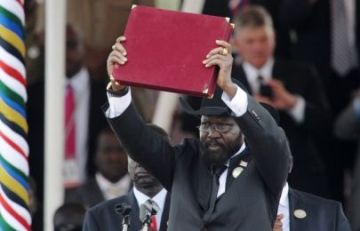South Sudanese president sacks deputy chief justice
March 5, 2016 (JUBA) – The South Sudanese President Salva Kiir on Friday issued an order, which saw the country’s deputy chief justice, Madol Arol Kachuol removed.

The order of removal and replacement come into effect on 4 March, but no reasons were given as to why the South Sudanese leader issued the surprise order on Friday evening.
Several judicial officials attributed this to brewing differences between the chief justice and several judges over the manner in which the former handle the country’s judicial system.
Majority of the judges have had the backing of the sacked deputy chief justice. Others claimed the changes could be related to allegation that the national alliance of 18 major political parties, which petitioned the Supreme Court over the creation of 28 states had indicated preference for the sacked deputy chief justice to preside over their case instead of chief justice they have accused of conflict of interest to preside over the case.
For instance, the chief justice congratulated president Kiir on the creation of 28 states as the Aguok community leader. He denied acting in an official capacity , claiming it was his constitutional right as the citizen of the country.
Kachuol is also reported to have played a neutral judicial role in the trial of four former political detainees who included Ezekiel Gatkuoth Lol, Pagan Amum, Majak D’ Agot and Oyai Deng Ajak. He personally examined the charges brought against the officials and reportedly told the prosecutor that there were not sufficient evidences to implicate the accused. This, according to judicial and several government sources said, did not go well with the government and chief justic allegedly felt he had been undermined by his junior.
His removal from the position comes at the time a case in which the National Alliance has asked the chief justice to excuse himself from presiding over the case. The case was brought against the Establishment Order; a unilateral order issued by President Salva Kiir in October 2015 to divide up the country and expanded the number of the states to 28 from the constitutionally recognized 10 states in a clear violation of peace agreement which he and his former deputy in government and party turned leader of armed opposition, Riek Machar, signed in august, 2015, to end more than 21 months of conflict.
The President, further states the constitution, has powers to remove Justices and replace them in exceptional circumstances. Article 135 (2) of the constitution states that Justices and Judges may be removed by an order of the President for gross misconduct, incompetence and incapacity and upon the recommendation of the National Judicial Service Commission.
The constitution also states that the president shall appoint Supreme Court Justices “upon the recommendation of the Judicial Service Commission, and his appointment shall be subject to approval by a two-third majority of all members of the National Legislative Assembly.
(ST)
